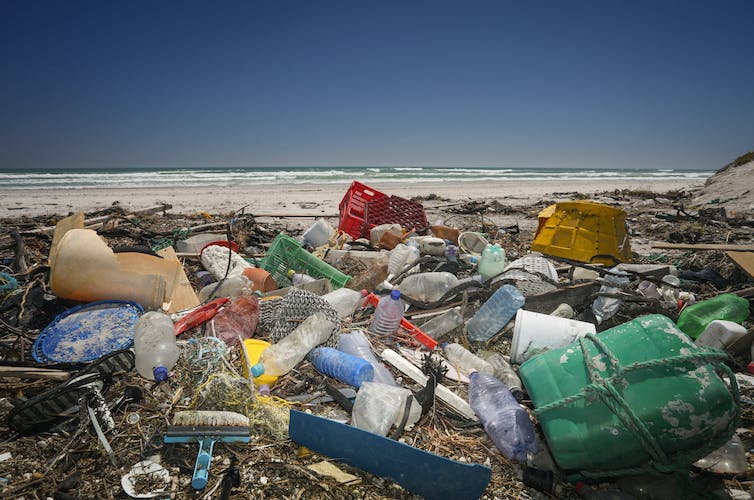Plastic pollution has become such major problem that it’s threatening our human rights. That’s the view of two UN special rapporteurs (human rights advisers) who recently issued a joint statement, warning against the “overwhelming toxic tidal wave” of plastic endangering us and the environment “in a myriad of ways over its life cycle”. They called for urgent action on dealing with this global crisis.
Such a call could not be timelier, as governments have achieved disappointingly little so far. Yes, most restrict single-use plastic bags, or some other type of single-use plastics. But such measures are clearly not enough.
Even the UN treaty on plastic pollution, which has been agreed in principle and is currently being negotiated, is unlikely to produce fundamental change, at least in the short term. And there is no guarantee any new measures it leads to would have a different fate from the many existing plastic pollution laws that governments fail to implement.
Amid growing concerns over plastic pollution and weak governmental response to it, individuals and communities have been seeking action by resorting to courts. I recently published an academic study on the global tug of war over plastic going on in courts in more than 30 countries.
I found lots of different approaches. Some argue that their governments do not implement the existing laws. For instance, a group in the Philippines has persuaded the country’s supreme court to review the government’s implementation of solid waste management law.

Erlo Brown / shutterstock
Others claim that their governments do not consider the impacts of plastic pollution when allowing new factories making plastic products. One group of Māori in New Zealand recently appealed a decision to expand a billion-bottle-per-year water plant.
Some seek compensation from plastic-producing companies for dumping waste into rivers, such as the Texas residents who won a US$50 million (£39 million) settlement after finding billions of plastic pellets in their local waterways.
Local governments are also increasingly turning to courts claiming that businesses deceptively market their plastic products as recyclable. Cases like these send a clear message to the governments and businesses that individuals and communities are concerned about the impacts of plastic pollution and want more decisive action to stop it.

batuhan taskinkaya / shutterstock
But at the same time, all these cases are only one part of the picture. Increasing restrictions on plastic products also result in claims brought by businesses that oppose such measures, including the producers of plastic products as well as supermarkets and restaurants, and ask the courts to quash them.
Cases where businesses argue that restrictions on plastic products cause economic loss or are scientifically unsubstantiated are very common throughout the world.
Businesses also regularly challenge provinces or cities that adopt additional restrictions to the ones imposed by national authorities. Such cases send the message that our society is still massively dependent on plastic products, and so measures to address plastic pollution need to be systemic.
The role of courts in tackling plastic pollution
The courts’ involvement has direct consequences for any attempts to tackle this global crisis and for action on environmental and health protection more generally. For example, businesses might be able to persuade a court to declare local anti-plastic pollution measures invalid.
This happened in Mexico recently when the nation’s supreme court ruled a ban on single-use plastics by the state of Oaxaca was unconstitutional. The success of such cases can prompt other businesses to challenge local environmental and health protection measures.
On the other hand, if a court upholds such measures, other local governments may decide to follow the example of their neighbours and introduce such measures as well. If anti-plastic pollution measures already exist, they can be used to persuade the courts that further action should be taken.
Similarly, by holding businesses accountable for pollution resulting from various stages of plastic life cycle, courts help protect vulnerable individuals and communities from various human rights violations caused by plastic pollution.
No single country has a comprehensive response to plastic pollution. But many are gradually tightening up measures on single-use plastics which moves the world closer towards a comprehensive regulatory response to this crisis.
Courts will undoubtedly continue playing an important role in this process. Those concerned about plastic pollution will keep pressing for tighter regulation, while those who oppose regulation will have more restrictions to challenge.

Don’t have time to read about climate change as much as you’d like?
Get a weekly roundup in your inbox instead. Every Wednesday, The Conversation’s environment editor writes Imagine, a short email that goes a little deeper into just one climate issue. Join the 20,000+ readers who’ve subscribed so far.
